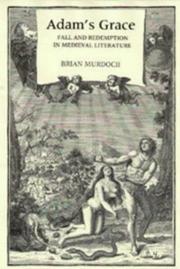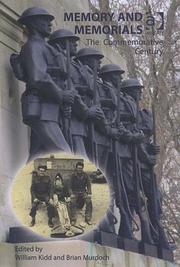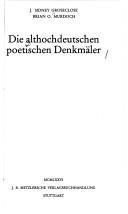| Listing 1 - 10 of 10 |
Sort by
|

ISBN: 085991559X 0585287716 9786610545254 1280545259 1846150019 Year: 2000 Publisher: Cambridge Brewer
Abstract | Keywords | Export | Availability | Bookmark
 Loading...
Loading...Choose an application
- Reference Manager
- EndNote
- RefWorks (Direct export to RefWorks)
A study of the use of medieval literary texts to explain the Fall and Redemption, the universality of original sin, and the identity of mankind with Adam and Eve. 'The Fall of Adam and the redemption of mankind has been one of the central myths of Western European civilisation for nearly two thousand years; any increase in our understanding of the way in which it has been understood and represented is an increase in our understanding of the whole of European sensibility. This is what the author has achieved in this book... Despite the immense amount of information that is given, the author's own prose has such clarity and fluencey that noone could help but be informed and entertained.' JOURNAL OF THEOLOGICAL STUDIES. The theme of 'Adam's Grace' is the interplay of theology and literature across a wide range of genres and vernaculars: in particular, the use of medieval literary texts to explain the balance of the Fall and Redemption, the universality of original sin, and the identity of mankind with its first parents, Adam and Eve. The process begins with the Christian tradition of apocryphal Adam-lives, which live on and develop in many vernaculars. Later, Adam is used as a literary model, on whom many well-known Christian figures of the middle ages - knights, popes, emperors, kings and saints - can be seen to be based. They include Gregorius, the "medieval Oedipus", whose case demonstrates the resolution of the paradox of the 'felix culpa'; Parzival, searching for the Holy Grail and for God in the hostile world into which he has been ejected; and the many medieval figures (literary and even historical) associated with the legends of leprosy, blood and healing which reflect the sacrifice in the Redemption. The last part of the book looks at the drama, first of all the medieval representations of the Fall and the Passion, and then the rather different portrayal of Adam on stage in the Reformation and the Counter-Reformation. BRIAN MURDOCH is Professor of German at Stirling University.
Book
ISBN: 1800104022 1800104030 1640141170 Year: 2022 Publisher: Rochester, New York : Camden House,
Abstract | Keywords | Export | Availability | Bookmark
 Loading...
Loading...Choose an application
- Reference Manager
- EndNote
- RefWorks (Direct export to RefWorks)
Death still comes to everyman, but this study of three twentieth-century German plays shows the harder challenge of living without salvation in an age of war and unprecedented mass destruction.
German drama --- War in literature. --- History and criticism. --- Toller, Ernst, --- Borchert, Wolfgang, --- Frisch, Max, --- Death. --- Everyman. --- Existential Guilt. --- German Drama. --- Identity. --- Morality. --- Politics. --- Twentieth Century. --- War.

ISBN: 1281949361 9786611949365 1571136770 1571133283 Year: 2006 Publisher: Rochester, NY : Camden House,
Abstract | Keywords | Export | Availability | Bookmark
 Loading...
Loading...Choose an application
- Reference Manager
- EndNote
- RefWorks (Direct export to RefWorks)
Erich Maria Remarque is a writer of great popularity who has rightly been described as a "chronicler of the twentieth century." He is both a German writer and a genuinely international one. Although he spent much of his life in exile from Germany, most of his novels reflect its twentieth-century history: the two world wars and the Weimar and Nazi regimes, and especially their effects on the individual. His portrayals of the lives of refugees from Nazi Germany are especially vivid. His themes are universal, dealing with human relationships, with love in particular, and with the provisional nature of life. Often seen as a one-novel writer due to the immense success of All Quiet on the Western Front, Remarque wrote many other novels, major works that have nearly all been filmed and have remained popular. Nor should it be ignored that his works are above all else immensely readable: not a negligible criterion. This new study of Remarque's novels treats them as a chronicle of the century, but also looks at them as works that go beyond the reflection of historical events.
Remarque, Erich Maria, --- Criticism and interpretation. --- Remarque, Erich Maria. --- Remarque, Erich Maria --- Remark, Erich Paul --- Remark, Erikh Marii̐a --- Ремарк, Эрих Мария --- Ремарк, Э. М., --- Remarque, E. M. --- Ремарк, Ерих Мария --- Ремаркъ, Ерихъ Мария --- Rimarḳ, Erikh Mariyah --- רמרק, אריך מריא, --- רמרק, אריך מריה, --- רעמארק, עריך מאריא, --- רעמארק, עריק מאריא --- רעמארק, ע. --- רעמארק, ע. מ. --- רימארק, אריך מאריה --- Rimārk, Irīsh Māriyā --- رمارک، اريش ماريا --- LITERARY CRITICISM / European / German. --- Black American Experience. --- Cinematic Representation. --- Erich Maria Remarque. --- Literary Adaptations. --- Love. --- Nazi Regimes. --- One-Novel Writer. --- Popular Literature. --- Provisional Nature of Life. --- Refugees. --- Twentieth Century. --- Weimar. --- World Wars.
Book
ISBN: 1805433075 Year: 2024 Publisher: Woodbridge, Suffolk : Boydell and Brewer,
Abstract | Keywords | Export | Availability | Bookmark
 Loading...
Loading...Choose an application
- Reference Manager
- EndNote
- RefWorks (Direct export to RefWorks)
Accurate and entertaining translations of three texts that reveal much about medieval political thought and remain relevant to today's political systemsRecent political events around the world, not least January 6, 2021, have shown that political systems long thought to be resilient can be surprisingly at risk. This edition offers an introduction to and prose translations of three texts that demonstrate just how precarious things can be even in a rigidly structured society (here the medieval Holy Roman Empire). The texts, the anonymously authored Duke Ernst, Konrad of Würzburg's Henry of Kempten, and Heinrich's Reynard the Fox, are also literary works, designed to entertain. Two of them are adventure stories, but carry a message about the care needed to prevent the escalation of violence; the third is a bleak warning against unscrupulous advisors. As works of literature they are varied. The first moves from recognizable history to develop into an early fantasy novel, as the central character goes boldly to distant places outside the known world and meets, fights with, and learns from strange and alien creatures, before returning to the "real" world. The second, a novella, is ostensibly about chivalric bravery, but it is set in a pre-chivalric period, and shows how (then as now) a trivial incident can escalate towards disaster. The third is an animal fable, part of the extensive tradition of Reynard the Fox, initially familiar, but developing into a violent and dark tale that ends with the death of a king.
German literature --- Tales --- Tales, Medieval --- LITERARY CRITICISM / General. --- Otto mit dem Bart. --- Otto the Great. --- Reinhart Fuchs. --- anarchy. --- crisis. --- diplomacy. --- feudal system. --- imperialism. --- nobility. --- pardon. --- peace. --- satire. --- scoundrel. --- trickster. --- verse.

ISBN: 0754607356 9780754607359 9781315249186 9781351918275 Year: 2004 Volume: *4 Publisher: Aldershot Ashgate
Abstract | Keywords | Export | Availability | Bookmark
 Loading...
Loading...Choose an application
- Reference Manager
- EndNote
- RefWorks (Direct export to RefWorks)
War memorials --- Memory (Philosophy) --- War and society --- World War, 1914-1918 --- World War, 1939-1945 --- Monuments aux morts --- Mémoire (Philosophie) --- Guerre et société --- Première guerre mondiale --- 2ème guerre mondiale --- Congresses. --- Monuments --- Congrès --- 866 Herdenking en herinnering --- 355.1 --- 940.5 --- Krijgsmacht. Strijdkrachten. Leger. Militairen --- Geschiedenis van Europa--(sinds 1919; 20ste eeuw) (algemeen) --- 940.5 Geschiedenis van Europa--(sinds 1919; 20ste eeuw) (algemeen) --- 355.1 Krijgsmacht. Strijdkrachten. Leger. Militairen --- Mémoire (Philosophie) --- Guerre et société --- Première guerre mondiale --- 2ème guerre mondiale --- Congrès --- Memory --- European War, 1914-1918 --- First World War, 1914-1918 --- Great War, 1914-1918 --- World War 1, 1914-1918 --- World War I, 1914-1918 --- World War One, 1914-1918 --- WW I (World War, 1914-1918) --- WWI (World War, 1914-1918) --- History, Modern --- War monuments --- Art and war --- Memorials --- Military parks --- Soldiers' monuments --- European War, 1939-1945 --- Second World War, 1939-1945 --- World War 2, 1939-1945 --- World War II, 1939-1945 --- World War Two, 1939-1945 --- WW II (World War, 1939-1945) --- WWII (World War, 1939-1945) --- Congresses --- Mémoire collective --- Guerre mondiale (1914-1918) --- Guerre mondiale (1939-1945) --- Europe --- 20e siècle

ISBN: 1571131035 1571132406 9781571132406 9781571136428 9781571131997 157113199X 9781571132475 1571132473 9781571132468 1571132465 9781571131744 1571131744 9781402073069 9781571136015 9781571132499 157113249X 9781571136619 9781571132505 1571132503 9781571136626 9786611770570 1281770574 1571136010 9786611770600 1281770604 1571136428 9786611770631 1281770639 1571136614 9786611770648 1281770647 1571136622 9781571136374 9781571136435 9781571136862 Year: 2004 Volume: 4 Publisher: Rochester Camden house
Abstract | Keywords | Export | Availability | Bookmark
 Loading...
Loading...Choose an application
- Reference Manager
- EndNote
- RefWorks (Direct export to RefWorks)
In Germany, Weimar Classicism (roughly the period from Goethe's return to Germany from Italy in 1788 to the death of his friend and collaborator Schiller in 1805) is widely regarded as an apogee of literary art. But outside of Germany, Goethe is considered a Romantic, and the notion of Weimar Classicism as a distinct period is viewed with skepticism. This volume of new essays regards the question of literary period as a red herring: Weimar Classicism is best understood as a project that involved the ambitious attempt not only to imagine but also to achieve a new quality of wholeness in human life and culture at a time when fragmentation, division, and alienation appeared to be the norm. By not succumbing to the myth of Weimar and its literary giants, but being willing to explore the phenomenon as a complex cultural system with a unique signature, this book provides an account of its shaping beliefs, preoccupations, motifs, and values. Contributions from leading German, British, and North American scholars open up multiple interdisciplinary perspectives on the period. Essays on the novel, poetry, drama, and theater are joined by accounts of politics, philosophy, visual culture, women writers, and science. The reader is introduced to the full panoply of cultural life in Weimar, its accomplishments as well as its excesses and follies. Emancipatory and doctrinaire by turns, the project of Weimar Classicism is best approached as a complex whole. Contributors: Dieter Borchmeyer, Charles Grair, Gail Hart, Thomas Saine, Jane Brown, Cyrus Hamlin, Roger Stephenson, Elisabeth Krimmer, Helmut Pfotenhauer, Benjamin Bennett, Astrida Orle Tantillo, W. Daniel Wilson. Simon J. Richter is associate professor of German at the University of Pennsylvania.
German literature --- History --- 830 <09> --- 830 <09> Duitse literatuur--Geschiedenis van ... --- Duitse literatuur--Geschiedenis van ... --- History and criticism --- Duitse literatuur--Geschiedenis van .. --- Enlightenment --- Influence --- Classicism --- Pseudo-classicism --- Aesthetics --- Literature --- Civilization, Classical --- Civilization, Germanic --- Germanic literature --- Germanic peoples --- Literature, Medieval --- Germanic tribes --- Ethnology --- Indo-Europeans --- Teutonic race --- Germanic civilization --- Teutonic civilization --- Civilization --- Young Germany --- Sturm und Drang movement --- Storm and stress --- History and criticism. --- Influence. --- anno 1300-1399 --- anno 1400-1499 --- anno 1500-1599 --- anno 1600-1699 --- Duitse literatuur--Geschiedenis van . --- Duitse literatuur--Geschiedenis van --- German literature - Middle High German, 1050-1500 - History and criticism. --- German literature - Early modern, 1500-1700 - History and criticism. --- Sturm und Drang movement. --- British literature. --- German literature. --- Goethe. --- North American literature. --- Romantic. --- Weimar Classicism. --- accomplishments. --- alienation. --- complex cultural system. --- cultural life. --- culture. --- division. --- drama. --- excesses. --- follies. --- fragmentation. --- human life. --- literary period. --- motifs. --- novel. --- philosophy. --- poetry. --- politics. --- preoccupations. --- science. --- shaping beliefs. --- theater. --- values. --- visual culture. --- women writers. --- Charms. --- Chronicles. --- Early Middle Ages. --- German Literature. --- Heroic Material. --- Hildebrandlied. --- Latin Influence. --- Literary Language. --- Ludwigslied. --- Manuscript Culture. --- Old High German Literature. --- Otfrid's Gospel-Poem. --- Prayers. --- Translations. --- Clayton Koelb. --- Drama. --- Eric Downing. --- Impressionism. --- Lyric Poetry. --- Music-Drama. --- Naturalism. --- Nineteenth-Century German Literature. --- Poetic Realism. --- Prose Fiction. --- Romanticism. --- Social and Political Context. --- Symbolism.
Book
ISBN: 9789004400931 9004400931 900440094X 9789004400948 Year: 2019 Publisher: Leiden ; Boston : Brill,
Abstract | Keywords | Export | Availability | Bookmark
 Loading...
Loading...Choose an application
- Reference Manager
- EndNote
- RefWorks (Direct export to RefWorks)
This book is a study of the literary reception of the originally Greek love-story of Hero and Leander, examining the nature of the tale and demonstrating its longevity and huge popularity from classical times to the present, in a great variety of different genres. Chapters consider the classical versions (Ovid, Musaios, Martial), medieval and renaissance versions in various European languages, folk and literary ballads (and even a pop song), the lyric, dramatic versions, settings to music, burlesques and travesties in all genres, modern reflections of the story in (experimental) literary forms.
European literature --- Mythology, Greek, in literature. --- Greek influences. --- History and criticism. --- Hero --- Leander --- In literature. --- European literature. --- Literature. --- Hero, --- Leander, --- Leandar --- Leandr --- Léandre --- Leandro --- Leandros --- Leandrus --- Λέανδρος

ISBN: 1281770582 9786611770587 1571136371 157113199X Year: 2004 Publisher: Rochester, NY : Camden House,
Abstract | Keywords | Export | Availability | Bookmark
 Loading...
Loading...Choose an application
- Reference Manager
- EndNote
- RefWorks (Direct export to RefWorks)
A collection of fresh essays examining the wide scope and significance of early Germanic culture and literature. The first volume of this set views the development of writing in German with respect to broad aspects of the early Germanic past, drawing on a range of disciplines including archaeology, anthropology, and philology in addition toliterary history. The first part considers the whole concept of Germanic antiquity and the way in which it has been approached, examines classical writings about Germanic origins and the earliest Germanic tribes, and looks at thetwo great influences on the early Germanic world: the confrontation with the Roman Empire and the displacement of Germanic religion by Christianity. A chapter on orality -- the earliest stage of all literature -- provides a bridgeto the earliest Germanic writings. The second part of the book is devoted to written Germanic -- rather than German -- materials, with a series of chapters looking first at the Runic inscriptions, then at Gothic, the first Germanic language to find its way onto parchment (in Ulfilas's Bible translation). The topic turns finally to what we now understand as literature, with general surveys of the three great areas of early Germanic literature: Old Norse, Old English, and Old High and Low German. A final chapter is devoted to the Old Saxon Heliand. Contributors: T. M. Andersson, Heinrich Beck, Graeme Dunphy, Klaus D©ơwel, G. Ronald Murphy, Adrian Murdoch, Brian Murdoch, Rudolf Simek, Herwig Wolfram. Brian Murdoch and Malcolm Read both teach in the German Department of the University of Stirling in Scotland.
Germanic literature --- Literature, Medieval --- Civilization, Germanic. --- Germanic peoples. --- History and criticism. --- Germanic tribes --- Ethnology --- Indo-Europeans --- Teutonic race --- Germanic civilization --- Germanic peoples --- Teutonic civilization --- Civilization --- Germanic antiquity. --- Gothic literature. --- Old English. --- Old High German. --- Old Low German. --- Old Norse. --- Roman Empire. --- Runic inscriptions. --- early Germanic tribes. --- early Germanic writings. --- indigenous performance.
Article
Abstract | Keywords | Export | Availability | Bookmark
 Loading...
Loading...Choose an application
- Reference Manager
- EndNote
- RefWorks (Direct export to RefWorks)

ISBN: 3476101401 9783476101402 Year: 1976 Volume: 140 Publisher: Stuttgart Metzler
Abstract | Keywords | Export | Availability | Bookmark
 Loading...
Loading...Choose an application
- Reference Manager
- EndNote
- RefWorks (Direct export to RefWorks)
German literature --- anno 500-1199 --- Civilization, Medieval, in literature --- History and criticism --- -Civilization, Medieval, in literature --- Civilization, Medieval, in literature. --- History and criticism. --- German literature - Old High German, 750-1050 - History and criticism --- ALTHOCHDEUTSCHE LITERATUR --- EINFÜHRUNG
| Listing 1 - 10 of 10 |
Sort by
|

 Search
Search Feedback
Feedback About UniCat
About UniCat  Help
Help News
News